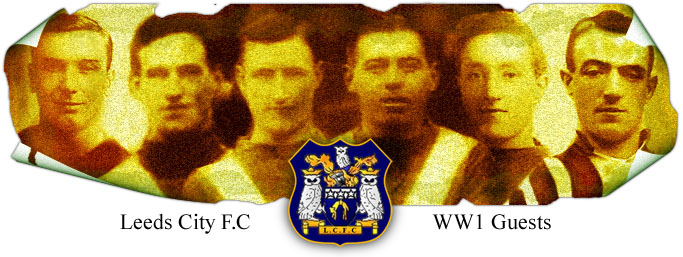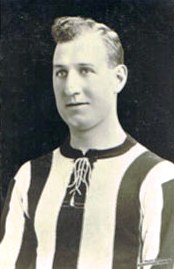

Curry: Thomas (Tom)
1919-1919 (Leeds City War-time Guest Player Details)
Left Half
Born: South Shields, Co. Durham: 01-09-1894
Debut: v Sheffield United (h): 08-03-1919
Height & Weight: Unknown
Tom Curry was a guest who played at Left Half in the home fixture with Sheffield United on the 8th March 1919, which was won 2-1 by the Peacocks. He was one of
many Newcastle United players that gave their service to other clubs when the North Eastern clubs closed their doors during the First World War. St James' Park was
used by the Army as a site for a rifle range. Of the forty Newcastle United professional at the start of war in 1914, twenty-seven volunteered for the army. Tom Curry
volunteered for the Engineer's Corps. While he also would have played other clubs in wartime games, it proved to be his only appearance for Leeds City. According to
the Leeds Mercury's report, "The half-back play was dogged if not brilliant, the work of Lamph and Curry giving Leeds a slight advantage in the initiation of attacks."He
was a player for Newcastle United as a wing or half back. Curry started his football career with South Shields St Michael's and then South Shields Parkside. Tom was
signed by Newcastle United as an eighteen year old from amateur club South Shields in 1912 but would not make his debut for seven years. Newcastle United officially
all but closed down on 22nd July 1915. The club in effect being mothballed for the rest of the war. When football resumed in 1919 Tom made his professional debut for
the Magpies at the age of Twenty-five. He finally made his debut against Arsenal at Highbury on the first game of the season on 30th August 1919. However, he was not
a regular as the Newcastle team contained several excellent wing and half backs at that time. In the early twenties Newcastle had a very good team and were often
challengers for the Football League Championship. The Magpies won the FA Cup in 1924 but Curry did not play as he was still a reserve player. Tom went on to make
Two Hundred and twenty-one League appearances for Newcastle United and scored five goals, he also played fourteen F. A Cup ties. In a 1990's poll he was voted
eighty-eighth greatest Newcastle United player of all time. While he did not earn international recognition he did play for the Football League in a 2-2 draw with The Irish
League at Anfield on 19th November 1919 in front of a 20,000 attendance and refereed by Arthur Pellow. Joe Clennell opened the scoring five minutes before the interval,
as the home side led 1-0 at half-time. Davy Reid brought the scores level eleven minutes into the second half. Clem Stephenson gave the home team a 2-1 lead and Pat
Robinson scored the second equaliser after eighty minutes, which remained the final score. The teams lined up: Football League: Sam Hardy (Aston Villa); Ephraim
Longworth (Liverpool), William 'Bill' Cook (Oldham Athletic); Tom Curry (Newcastle United), Joe McCall (Preston North End), Billy Watson Burnley); Claude Jephcott
(West Bromwich Albion), Clem Stephenson (Aston Villa), Tom Browell (Manchester City), Joe Clennell (Everton), Jack Crisp (West Bromwich Albion). Irish League:
William Liddell (Glentoran); David Rollo (Linfield), Fred Barrett (Belfast Celtic); Billy McCandless (Linfield), Johnny Scraggs (Glentoran), Mickey Hamill (Belfast Celtic);
David Lyner (Glentoran), Pat Robinson (Distillery), David Reid (Distillery), James Ferris (Belfast Celtic), Marshall McEwan (Linfield). In 1929 he left Newcastle on a free
transfer to Stockport County. In 1930, after scoring once in nineteen appearances, Curry retired from playing football and he was soon appointed as the trainer of Carlisle
United in 1930 and, after four years at Brunton Park, he moved to Old Trafford where he would spend twenty-four years as a loyal servant under managers Scott Duncan,
Walter Crickmer and Matt Busby. Football was suspended due to the Second World War in 1939, and when it started up again, Curry had a new manager in Matt Busby.
In those days a trainer was half fitness coach and half technical coach. Matt Busby held Tom in such high regard he asked Tom to stay with the club when he was
appointed manager in 1946 and once stated Tom was "the best trainer in Britian" In 1948 Tom was appointed trainer to the Great Britain Olympic football team, managed
by Matt Busby. Tomís life was cut tragically short on 6th February 1958, when a plane carrying players, officials, diplomats and media from a European Cup match in
Belgrade crashed at Munich Airport after a scheduled refuelling. Those who lost their lives are remembered in memorials in Munich and Manchester, with the Munich
Tunnel beneath Old Traffordís South Stand opened in 2008.
| War-time Guest Appearances | Goals |
| |
| Principal Tournament 1 | 0 |
| Subsidiary Tournament 0 | 0 |
| Total 1 | 0 |